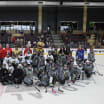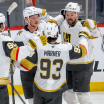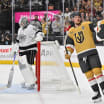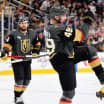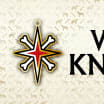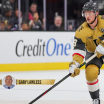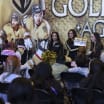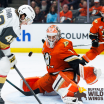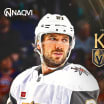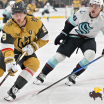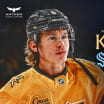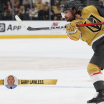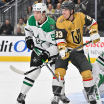Checking in with GM Kelly McCrimmon
Kelly McCrimmon is a hockey lifer. A player, coach, manager and owner.
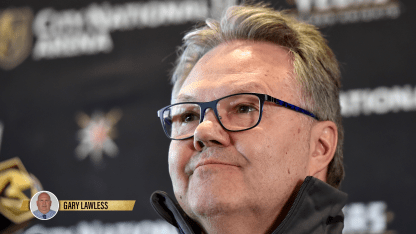
The GM of the Vegas Golden Knights has seen it all. Twice. He's also driven the team bus. Even a hockey person with McCrimmon's resume, however, finds the current state of affairs in our world and game to be unlike anything previously experienced.
McCrimmon is a driven executive with endless energy and certainly hasn't spent the pause with his foot off the gas. The 59-year-old native of Plenty, Saskatchewan has been working with his staff preparing for the amateur draft, free agency and potential NHL playoffs. Eventually the hockey business will restart and it's McCrimmon's responsibility to make sure the Golden Knights are ready for any and all eventualities.
Here's an update from McCrimmon on the state of many things VGK as Phase 2 of the NHL's return to play plan begins to unfold.
Gary Lawless:Is there anything that you can equate this current situation to?
Kelly McCrimmon:No, it is uncharted territory for everybody. Not only in the game of hockey, but in society in general. I think the challenging aspect of this, as it relates to hockey, is it feels like the offseason but we're getting ready for playoffs. It's at a time of year where we'd be preparing for the NHL Entry Draft and free agency discussions regarding the makeup of our team. Of course, that isn't the case because it's not the offseason, as we hopefully are moving into the playoffs.
GL:What was the original reaction and plan after the season was officially paused in March?
KM:I think initially, it was a little surreal for everybody. So many of these things are much larger than hockey, but it was surreal in that it was almost unthinkable that the season would be paused. We were in Minneapolis and flew back to Las Vegas without playing the game. I believe that most of us felt that in a couple weeks we might be back playing again. As the realization that it's going to be much longer, it's also the realization that no one knows how long. From there, we settled in and developed new routines with our staff. Microsoft Teams was a real important tool for us with all of our business with respect to our amateur scouting staff and pro scouting staff. We conducted year-end meetings with both of those groups with ongoing weekly discussions we had with our coaching staff and internally with different people with respect to our American Hockey League franchise. Once you got over the magnitude and gravity of what actually was happening, we settled in and developed pretty good routines and continued to get some work done.
GL:What has that work been?
KM:Well I mentioned the NHL Draft. We've done a lot of work with the amateur staff. They would have been in Vegas for year-end meetings towards the middle of May. The NHL Combine, which is an event held in Buffalo, New York the first week of June, gives teams and organizations the chance to interview top prospects so we went through that entire process virtually with our staff and the different prospects. We've had ongoing meetings with our pro staff discussing a number of different topics. Those have been weekly meetings that have kept everyone engaged and up to speed with not only our own roster, but maybe more importantly the rosters around the NHL as we upgrade our own rankings and talk about the makeup of different teams. Also, the coaches, as they stay current and prepared in terms of their discussions that they've had with regards to teams that we would potentially play if/when the season resumes with playoffs.
GL:Are there any advantages you've discovered from holding these meetings virtually?
KM:I don't know that there is anything better. I think what the positive takeaway is, certainly we can do our work virtually if needed. That is going to open up to a lot of opportunities. It may replace an in-person meeting over the course of a year, or it may give us the opportunity and vehicle to have additional meetings if we deem necessary. I think that within the scouting staffs themselves, they'll probably have meetings more regularly as they discuss their own schedules and viewings on different prospects throughout the scouting season. That has probably been the biggest takeaway positively through the process. I think any of us enjoy and feel the need for in-person meetings at certain points in time, so it won't replace those, but certainly it's going to give us a lot more options in terms of having additional meetings or maybe replace some meetings from time to time.
GL:What have the negatives been?
KM:I don't really think there has been any negatives. With the player prospect interviews, that all teams would have done I expect, just the opportunity to see the player, shake his hand and meet him. You can't replicate that to the same degree. In terms of asking questions and getting a feel for the person, it is very sufficient, and we were able to get a real good impression on a lot of the players. The physical testing, which would have been part of the NHL Combine that takes place on the final day, is valuable for all teams. The one thing I should mention is that we were at no disadvantage compared to what every other team in the NHL was experiencing. The one objective right from the offset that we had across our entire organization was that there would be teams that handle this better than others. It is unfortunate and not what any of us want, but let's do the best job we can in this period of waiting out the pandemic and be better than anyone else at what we're doing. So, we've tried to do that and as a result, we've been able to accomplish a lot of things in the almost three months we've been in the pause.
GL:There are always set dates for mile markers in the season like the NHL Draft, the start of free agency, etc. but we don't have those now. Have you had to be more agile as an organization?
KM:Well, it is what it is. Has it taught me anything? It's taught me perspective as I've mentioned a few times. The magnitude and reality of a pandemic is part of that. Watching the devastation and tragedy across the world and specifically in North America. We are a slave to our calendars. This industry is one I've been in my entire life where there are certain things you're doing at certain times. Like, the NHL Draft is this weekend, free agency starts this week, training camp starts here, you get your NHL schedule and that slots in, so you've got everything around that. You've got your major scouting events that go on the calendar and the world championships which were cancelled and the Ivan Hlinka tournament, usually the beginning of the scouting season in August, that's been cancelled. So, there are a lot of adjustments that need to be made. There's no reason to be frustrated and no value in being frustrated. Everyone is in the same boat and I feel that we've been pretty competent in coming up with routines where we've stayed connected, stayed engaged and got work done. That's really all you can do. We'll all have an appreciation for normal when it returns. It will be a different normal but we'll all value and appreciate that. Like a lot people, I think the three months that we've been on pause has given us all a chance to appreciate some of the simpler things in life. I think it's put family and being at home more at the forefront. We've all done some things with people close to us more than we have in the past and those are all good things. There are a lot of experiences like that that people have gone through and will carry out of this and will be part of our day-to-day lives moving forward.
GL:Normally, would your draft list be close to final right now?
KM:We're at a very similar position right now to where we would be during any other year. The NHL draft combine would have concluded on June 6 and we've now concluded our interviews. It's very parallel to what we'd do ordinarily. We'll have meetings throughout the rest of June. It's not necessarily by design, but by virtue of the timing, we'll bring our process to a close as if we were drafting during the regular and expected dates which were June 26 and 27.
GL:Is there a danger in looking at the same players too much?
KM:We're not looking at players anymore. Since mid-March, we've been watching video and there's been great value in that to finish off that evaluation process. That part of it is less of a piece of the process now. Now, it's discussions, evaluation, comparison, projection and those types of things. The live viewings occurred over the course of the scouting calendar which started with the Ivan Hlinka tournament in August and goes through early March. We've supplemented some of that with video and now we have our discussions. There's not a risk that we're seeing these players too much. I think that part has taken care of itself.
GL:What's at the top of your GM desk in terms of getting ready for the next phase of the NHL season?
KM:The preparation work that's gone into it from an organizational standpoint to prepare for Phase 2 has been very complex and very regimented. It depends significantly on the equipment staff and the training staff. We have discussions with the players and with the NHL. It's no small feat that we're at the point where buildings are opening again, and Phase 2 has started. We'll have ongoing work for what soon becomes Phase 3. That's going on in the background in addition to all the things we've talked about in respect to all of the different markers we have on the calendar ahead.
GL:Are you in the process of determining what your roster will look like?
KM:Yes, we've had discussions about what our taxi squad will be, what those limitations will be. There's a suggestion it'll be 28 skaters, so determining if that in fact is the case and if so who those seven are. All those different types of decisions that will have to be made as more information is available.
GL:Is the round robin style an attractive option, seeing as you could improve from a third seed to a first seed?
KM:I don't know exactly what those benefits will be. I know that we felt strongly that we wanted some meaningful games before the playoffs. This will give us meaningful games because there is a considerable amount at stake between the games that we'll play with the other three teams in the round robin. That'll be helpful. There'll be a couple of exhibition games prior to the round robin which is going to be valuable for us. I expect that we're going to be tremendously excited to be playing. I know that our players do want to play, they're real anxious to play. I think like management and the coaching staff, we have a lot of faith in our team and real high hopes for what we hope is an extended playoff.
GL:Max Pacioretty was one of the first people to say, that I heard, that this was going to be one of the toughest Stanley Cups to win because everyone is going to be healthy. How do you handicap the competition?
KM:Well, Max's point is accurate. Teams are going to be of better health than, let's just go back to the middle of March. They're going to be of better health than they would've been in the middle of March. They're going to be of better health than they would be most likely in any other year. It was a chance for people to recharge, maybe not quite the war of attrition as the playoffs begin. I expect the hockey to be great, quite frankly. Will it take a couple of games? Likely, but today's athlete is well conditioned. Today's NHL teams are extremely well coached. I expect that the hockey is going to be very well played.
GL:Someone told me the hockey was going to be terrible, and I looked at them and said well the best hockey I've ever seen was the Canada Cup in 1987 when it was played in the summer at the end of a break. I know every team isn't Team Canada. I know every team isn't Russia, but those guys were able to go through a training camp, play some preseason games and when that tournament started, play hockey at a level that has rarely been seen. That to me is the best example of how quickly they can get it going.
KM:I expect that's what you'll see. I believe players and team will be playing at their highest level in very short order.
GL:The trade for Robin Lehner to improve your goaltending was obviously going to be very important if there hadn't have been a pause, but because of the unpredictability of this kind of layoff we don't know how people are going to react to it. You have two elite goaltenders, which gives you, to my thinking, two chances for one of them to be able to snap back into elite form. Do you think that trade looms a little larger now?
KM:No, I don't think so. It was a trade that was made to really solidify our goaltending, to make it a strength going into the Stanley Cup Playoffs. Again, we're hopeful we get there and if we do, we're extremely confident that we have real strength at that position. I believe the seven games we played that Pete rotated them - Marc-Andre played four, Robin played three. With two exhibition games and with three round robin games, that will give Pete and the coaching staff the opportunity to use those two goalies how they see fit. Those are the decisions the coaches will make when that time comes, but it's comforting that we have as good of players in net as we do.
GL:Phase 2 started Monday, and you had a whole bunch of players skate. How did you greet that news that they were going to let you get the guys going?
KM:It varies around the NHL. Our situation has been a little unique I think from mid-March when the NHL went on pause and our players almost exclusively stayed in Las Vegas. It shows in some respects what our players think of Las Vegas and how they enjoy living there. I believe there's also a piece of each player that feels connected because we're all in Las Vegas. Again, you know from your conversations with the players, we have high hopes and high aspirations to be a really good team here. I think just from a chemistry standpoint we're a place where the guys feel the way they do about wanting to stay together, wanting to be in the same city and we've had the turnout for Phase 2 that we've had. It's nice to see. I think it's a good sign.

